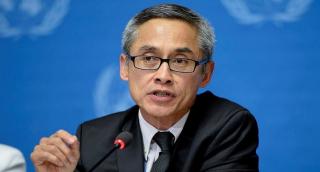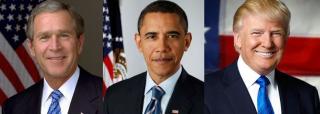The Future of Human Rights Protection at the United Nations
By Bruce Knotts
A troubling new initiative has just been proposed at the United Nations which threatens all human rights protection, but focused on sexual orientation/gender identity human rights. On Monday, the NGO Committee on Human Rights, of which I am a co-chair, met the newly appointed Assistant Secretary General for Human Rights, Mr. Andrew Gilmour. I had previously learned that the appointment of an Independent Expert on Sexual Orientation and Gender Identity (SOGI) by the Human Rights Council earlier this year was being challenged by member states at the UN General Assembly.
Mr. Gilmour confirmed that this information was true and very troubling. The Human Rights Council, which is located in Geneva, was created by the UN General Assembly, but heretofore, the UN General Assembly has not overruled its decisions. In this instance, the African Block and the Organization of Islamic Countries and others support a motion by Sierra Leone calling for the UN General Assembly to overturn the decision by the Human Rights Council to appoint an Independent Expert on SOGI.
The Unitarian Universalist United Nations Office (UU-UNO) has strongly advocated the creation of this position since 2009. There were many times in the past, when the creation of such a position seemed likely, but then for political reasons, it didn’t happen. Finally, this year it did.

Vitit Muntarbhorn of Thailand was selected to be the UN's Independent Expert on protection against violence and discrimination based on sexual orientation and gender identity. The position's existence is currently under threat from a General Assembly initiative.
Mr. Gilmour said that if the issue were just about supporting the LGBTQI Independent Expert position, most members states of the UN would probably vote for its elimination. However, there is a larger principle involved. If the UN General Assembly can overrule this decision by the Human Rights Council, it can overrule all Human Rights Council decisions, which of course would negate the entire existence of the Council. In addition to this proposal, there is another motion made by the government of Egypt calling on all the staff of the Office of the High Commissioner for Human Rights to refrain from commenting on human rights unless specifically authorized by the UN General Assembly.
Both of these measures are generally supported by all the UN member states which have bad human rights records. There is, however, one unlikely champion of the current human rights system: Ethiopia. The Ethiopian permanent representative to the UN has been very vocal in defense of the independence of both the Human Rights Council and of the Office of the High Commission for Human Rights to stand up for human rights around the world.
The High Commissioner for Human Rights, Prince Zeid Ra'ad Al Hussein has been very eloquent in his defense of human rights. He said in his Opening Statement to the 29th Session of the Human Rights Council on June 15, 2015.
“I am often told in this chamber, in our debates, that I should not be "naming and shaming" member states. Somehow the naming is, or has become, the very shame itself. This is a disfigurement of the truth, which we must now reset. The shame comes not from the naming: it comes from the actions themselves, the conduct or violations, alleged with supporting evidence or proven. The greatest factory of shame is the blanket denial of human rights. The denial of the right to life shames unreservedly. Killing on a massive scale, shames stunningly, and inexhaustibly. The denial of the right to development also shames. The denial of human dignity shames. Torture shames. Arbitrary arrests shame. Rape shames. We name; the shame of States, where it exists, has already been self-inflicted. The loss of face for the affected countries has come well before OHCHR raises its independent voice. We say what we believe to be the truth, on behalf of victims. We have no monopoly over truth, but we believe our contentions can be supported by fact.”
Likely opponents of allowing the UN General Assembly to overrule the Human Rights Council are most of the nations of the Western Hemisphere, the European Union and some others. The United States Government will be a strong opponent to curtailing the authority of the Human Rights Council and the Office of the High Commissioner for Human Rights. However, that support will likely change or end altogether on January 20th, with the inauguration of a new president.

Former President George W. Bush, President Barack H. Obama, and President-elect Donald J. Trump
My last years at the Department of State were during the second George W. Bush administration, when John Bolton was the U.S. Permanent Representative (US PR) to the UN. The eight years of the Bush administration are the best guide we have at the moment to judge how a Trump administration will approach the UN. The current warm and supportive relationship that exists between USUN (U.S. Mission to the UN) and the UN will likely be replaced by the frosty relationship we know from the Bush administration. Towards the end of Bush’s second term, there was a noticeable warming of relations between USUN and the UN as the U.S. Government began to understand how useful the UN is to world security and combating global terrorism. For example, though initially extremely hostile towards the International Criminal Court (ICC) , when the ICC indicted Sudanese President Omar Al Bashir for gross human rights violations (and with Bashir also on the U.S. list of sponsors of terrorism), the Bush administration began to see how the UN agenda was compatible with their own foreign policy goals.
It looks like Newt Gingrich will be the new Secretary of State and someone very like John Bolton will become the US PR here at the UN. None of this is good news, but at least it is familiar. The UU-UNO will need to pivot into opposition mode and use our good relations with other member states to manage the situation and continue the progress we’ve been making over the last 8 years.
I also want us to remember the tremendous amount of U.S. Government investment in Africa which took place under the Bush administration. We have also seen that Republicans can do things that Democrats found difficult, like opening relations with China. We need to probe and look for opportunities. Those nuances and possible opportunities are not clear at the moment. Once the new team arrives, we’ll see what we can do.
Lastly, most of the Foreign Service Officers at USUN and the Department of State are career people, with years of service under various presidents, as I had for 25 years. Most of these are good people. There will be political litmus tests, as there were under Bush, but many will be a-political career Foreign Service Officers who may be willing to provide information and help.
Never lose hope; the fight for justice continues. Tough times can and have already awakened people who were dormant and less engaged in better times.
What can you do?
Write to the Obama administration and tell the President that he needs to do what he can in his remaining days in office to protect international LGBTQI rights.
Write to the incoming Trump team and let them know it is important for U.S. security interests to maintain the authority of the Human Rights Council as a bulwark against radical religious-based terrorism and gross human rights violations against minorities, including religious minorities around the world.
Tailor your message to your audience. LGBTQI rights are understood by Democrats, so use that language. National Security and combating international terrorism motivated by religious extremism which targets religious minorities (such as Christian minorities) is language to which Republicans will respond. It’s time to be clever and strategic.
Keep an eye on the work of the UU-UNO as we continue this work at the United Nations.